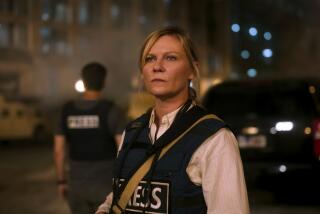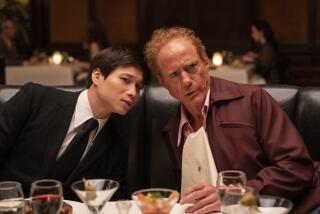No, but I Read the Screenplay : WALTER WINCHELL A Novel<i> by Michael Herr (Alfred A. Knopf: $18.95; 156 pp.) </i>
- Share via
A novel that begins with a preface is like a play subtitled “a comedy”--a signal of the author’s doubts. This particular preface is no false alarm. The reader is told: “You could call it a screenplay that’s typed like a novel, that reads like a novel but plays like a movie. Maybe it’s a completely new form, or a wrinkle on an old form, or a mongrel. Maybe it’s just a novel with a camera in it.”
Maybe it is just sheer laziness.
Michael Herr, author of one of the finest collections of essays on the Vietnam War (“Dispatches”) and co-author of one of the worst movies on war (“Full Metal Jacket”), has written what is, in effect, a glorified treatment for a movie about Walter Winchell. It is not quite a screenplay; it is not a biography; it is not a journalistic examination or expose; it is not a novel. It is, however, profoundly uninteresting.
For reasons that are only too obvious, Herr’s “screenplay” did not please the producer. For reasons still evident, but less justifiable, Herr has tried to palm off his failed “screenplay” as a new type of novel, and his publisher has aided and abetted him, with phrases like “equal parts novel, screenplay, biography, and cinematic dream.”
A screenplay is a useful, but limited, form of writing. It is the sine qua non of a good movie, and it is an essential item of research for authors analyzing movies and preparing biographies of screen writers. Though many are well crafted, few are works of art, and even fewer repay reading them for the sake of reading them. That goes double for hybrids.
Literary depth and camera depth are two different entities. The language of the screen and the language of the page are two different tongues. Perhaps a very gifted writer-director can bridge the gap, letting us see in the script what will appear in the viewfinder.
There is no evidence in “Walter Winchell” that Herr has a cinematic eye. There is massive evidence that he fancies he does. But the juxtaposition of camera directions with narrative prose only emphasizes the jury-rigged nature of the whole project.
Perhaps if filmed, the story of Walter Winchell, as Herr has conceived it, would have worked. Perhaps a talented director could have made something interesting out of the material. But he or she would have had to be a wizard with technique, because Herr’s “scenes” are very static, and he has provided very little content.
Arguably, Winchell the man, or Winchell the celebrity, offered the possibility of a lens through which some otherwise hidden truth about human nature or U.S. history could have been viewed and appreciated. After all, he was perhaps the most-read and listened-to reporter in the United States during the ‘30s and ‘40s. He associated with some of the most loathsome personalities of the time (gangster Owney Madden; J. Edgar Hoover; William Randolph Hearst; Sen. Joseph McCarthy). He was a confidant of President Franklin D. Roosevelt; he publicly confronted Martin Dies, the chairman of the House Committee on Un-American Activities, and he feuded with a large number of famous people, including President Harry S. Truman.
Herr seems to see Winchell as an icon, symbolizing the vulgarity of U.S. culture and the strange elements that constitute American patriotism; as a self-created celebrity with a built-in destructiveness, both creator and victim of a celebrity-adoring/hating attitude among the citizenry.
These insights are visible, but they are not depicted in a compelling literary or cinematic manner. Herr is interested only in surfaces. And he makes a virtue of what I consider this manuscript’s flaws: the “flat and telegrammatic prose,” the “externalizing” dialogue, and the presentation of the various characters “as types . . . in true biopic style.”
Since his characters “were not particularly famous for their introspection,” he has decided to make their dialogue the action for the plot. One is forced to conclude that either Herr needs more practice with that device or that it is a red herring concocted by a writer who did not know how to get inside his subject.
Whatever the conclusion, “Walter Winchell” is a shallow deceit, a major disappointment from the writer whose journalistic skills and literary imagination took the reader, via “Dispatches,” deep into the interior of the Vietnam combat experience.
More to Read
Sign up for our Book Club newsletter
Get the latest news, events and more from the Los Angeles Times Book Club, and help us get L.A. reading and talking.
You may occasionally receive promotional content from the Los Angeles Times.








